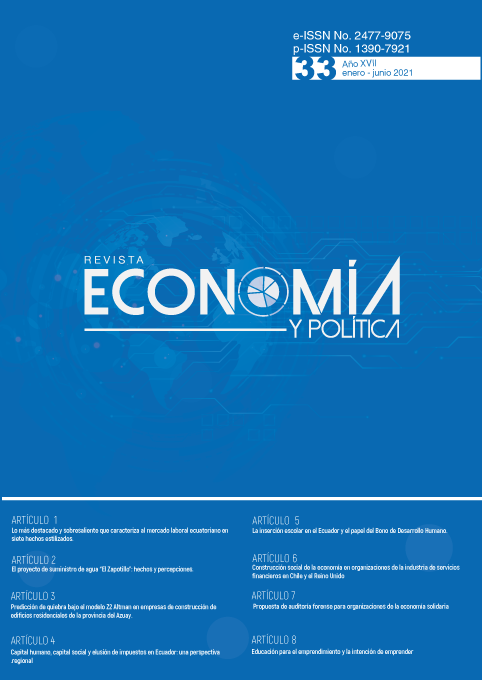La inserción escolar en el Ecuador y el papel del Bono de Desarrollo Humano
DOI:
https://doi.org/10.25097/rep.n33.2021.05Palabras clave:
Transferencias monetarias condicionadas, inserción escolar, diseño de regresión discontinuaResumen
Esta investigación analiza el impacto del Bono de Desarrollo Humano (BDH) sobre la inserción escolar, utilizando un diseño de Regresión Discontinua sobre los datos de la Encuesta Nacional de Empleo, Desempleo y Subempleo (ENEMDU) de diciembre de 2009. Los resultados indican que no hay efecto del BDH sobre la inserción escolar, considerando la asistencia a primaria y secundaria, y también la asistencia escolar global. Una posible explicación para estos hallazgos es el débil o nulo seguimiento y monitoreo del cumplimiento de la contraparte de los hogares beneficiarios de enviar a los niños a instituciones educativas. Se evidencia además, la necesidad e importancia de realizar evaluaciones de impacto periódicas en este tipo de programas sociales, para dar cuenta de los efectos en el mediano y largo plazo, así como, para mejorar su implementación, monitoreo y focalización.
Descargas
Citas
Almeida, R. (2009). El Bono de Desarrollo Humano en Ecuador: Encuentros y Desencuentros. Flacso.
Amores, C. (2010). Pobreza monetaria vs. Proxy Means Testing:¿ Son medidas de bienestar diferentes? (Master's thesis, Quito: FLACSO sede Ecuador).
Attanasio, O., Fitzsimons, E., Gomez, A., Gutierrez, M. I., Meghir, C. & Mesnard, A. (2010). Child Education and Work Choices in the Presence of a Conditional Cash Transfer Programme in Rural Colombia. Economic Development and Cultural Change, 58(2), pp. 181-210. doi: 10.1086/648188
Baird, S., Ferreira, F. H., Özler, B., & Woolcock, M. (2013). Relative effectiveness of conditional and unconditional cash transfers for schooling outcomes in developing countries: a systematic review. Campbell systematic reviews, 9(1), 1-124.
BCE. (2016). Información Estadística Mensual No.1978 - Diciembre 2016. Recuperado de: https://contenido.bce.fin.ec/home1/estadisticas/bolmensual/IEMensual.jsp
Becker, G. (1965). A Theory of the Allocation of Time. The Economic Journal, 75(299), 493-517. doi:10.2307/2228949
Buddelmeyer, H., & Skoufias, E. (2004). An evaluation of the performance of regression discontinuity design on PROGRESA. The World Bank.
Calonico, S., Cattaneo, M., & Titiunik, R. (2014). Robust Nonparametric Confidence Intervals for Regression-Discontinuity Designs. Econometrica, 82(6), 2295–2326.
Calvas, G. (2010). Evaluación de Impacto del Bono de Desarrollo Humano en la educación. Quito: FLACSO sede Ecuador.
Clarke, N. M., Grantham‐McGregor, S. M., & Powell, C. (1991). Nutrition and health predictors of school failure in Jamaican children. Ecology of Food and Nutrition, 26(1), 47-57.
CEPAL. (2017). Base de datos de programas de protección social no contributiva en América Latina y el Caribe. Obtenido de http://dds.cepal.org/bdptc/programa/?id=15
De Brauw, A., & Hoddinott, J. (2011). Must conditional cash transfer programs be conditioned to be effective? The impact of conditioning transfers on school enrollment in Mexico. Journal of development Economics, 96(2), 359-370.
De Tray, D. N. (1973). Child quality and the demand for children. Journal of Political Economy, 81(2, Part 2), S70-S95.
Diez, M. A. (2002). Evaluating new regional policies: Reviewing the theory and practice. Evaluation, 8(3), 285-305.
Dobronsky, J., & Moncayo, J. (2007). Impacto del Bono de Desarrollo Humano en el trabajo infantil. Secretaría Técnica del Ministerio de Coordinación de Desarrollo Social del Ecuador. Recuperado el 28 de 10 de 2017, de http://www.discapacidadonline.com/wp-content/uploads/2012/05/impacto-del-bono-de-desarrollo-humano-en-el-trabajo-infantil.pdf
Feijoó, M., & Davolos, P. (2016). Tres casos latinoamericanos de políticas de transferencia condicionada. Revista de Políticas Sociales, 3(4), 25-34.
Ferro, A. R., Kassouf, A. L., & Levison, D. (2010). The impact of conditional cash transfer programs on household work decisions in Brazil. In Child labor and the transition between school and work. Emerald Group Publishing Limited.
Gertler, P. J., Martínez, S., Premand, P., & Rawlings, L. B. (2011). La evaluación de impacto en la práctica. World Bank Publications.
Glewwe, P., Jacoby, H. G., & & King, E. M. (2001). Early childhood nutrition and academic achievement: a longitudinal analysis. Journal of public economics, 81(3), 345-368.
Gonzalez-Rozada, M., & Llerena, F. (2011). The Effects of a Conditional Transfer Program on the Labor Market: The Human Development Bonus in Ecuador. Washington, DC, United States: Inter-American Development Bank.
Guamán, J., Lara, E., López, R. A., & Ponce, P. (2019). Efecto del bono de desarrollo humano en el gasto en salud y educación en Ecuador utilizando propensity score matching. Revista Economía y Política, (30), 24-39.
Khandker, S., B. Koolwal, G., & Samad, H. (2010). Handbook on impact evaluation: quantitative methods and practices. The World Bank.
Lee, D. S., & Lemieux, T. (2010). Regression discontinuity designs in economics. Journal of economic literature, 48(2), 281-355.
Llerena, M. (2014). Evaluación de impacto del Bono de Desarrollo Humano BDH sobre el rezago escolar en Ecuador. Tesis. Universidad Torcuato Di Tella, Argentina.
Malec, M. R., & Ottone, L. M. (2019). Calidad en la inversión social: la Asignación Universal por Hijo en Argentina. En La calidad del gasto público a debate. CONGOPE, Ediciones Abya Yala.
Mideros, A., & O’Donoghue, C. (2015). The effect of unconditional cash transfers on adult labour supply: A unitary discrete choice model for the case of Ecuador. Basic Income Studies, 10(2), 225-255.
Mideros, A., & Gassmann, F. (2017). Fostering social mobility: The case of the Bono de Desarrollo Humano in Ecuador. Maastricht Economic and social Research Institute on Innovation and Technology UNU-MERIT, 1-29.
MIES. (2017). Ministerio de Inclusión Económica y Social. Recuperado de http://www.inclusion.gob.ec/bono-de-desarrollo-humano1/
Moreno, L. (2017). Assessing the effect of conditional cash transfers in children chronic stunting: the human development bonus in Ecuador. Analitika, Revista de análisis estadístico, 13(1), 83-131.
Mukudi, E. (2003). Nutrition status, education participation, and school achievement among Kenyan middle-school children. Nutrition, 19(7), 612-616.
Oosterbeek, H., Ponce, J., & Schady, N. (2008). The impact of cash transfers on school enrollment: Evidence from Ecuador. The World Bank.
Osorio, C. (2019). A Comparative Analysis of the Adoption of Conditional Cash Transfers Programs in Latin America. Journal of Comparative Policy Analysis: Research and Practice, 21(4), 385-401. doi:10.1080/13876988.2018.1491671
Peruffo, M., & Ferreira, P. C. (2017). The Long‐Term Effects of Conditional Cash Transfers on Child Labor and School Enrollment. Economic Inquiry, 55(4), 2008-2030.
Ponce, J. (2008). Educational Policy and Performance: Evaluating the impact of targeted education programs in Ecuador. Phd. Dissertation. Shaker Publishing.
Ponce, J. (2011). Impacto del Bono de Desarrollo Humano en Matrícula Escolar y Trabajo Infantil en el Área Urbana y Rural de Ecuador. Documento de trabajo, RIMISP.
Ponce, J., & Drouet, M. (2017). Evaluación de impacto del Programa de Escuelas del Milenio. Quito: Ministerio de Educación.
Rawlings, L. B., & Rubio, G. M. (2005). Evaluating the impact of conditional cash transfer programs. The World Bank Research Observer, 20(1), 29-55.
Roura, C. (2016). Análisis socioeconómico de los beneficiarios del Bono de Desarrollo Humano (BDH) a diciembre 2015 y elementos de política complementarios. Pontificia Universidad Católica del Ecuador.
Saavedra, J. E., & García, S. (2012). Impacts of conditional cash transfer programs on educational outcomes in developing countries: a meta-analysis. RAND Labor and Population Working Paper Series, WR-921-1.
Sáenz, I. (2019). Impact of the Ecuadorian Conditioned Cash Transfer Program on the Eradication of Poverty 2005-2018 (Doctoral dissertation).
Schady, N., & Araujo, M. (2008). Cash transfers, conditions, school enrollment, and child work: Evidence from a randomized experiment in Ecuador. Economía, 8(2), 43-70.
Skoufias, E. (2005). PROGRESA and its impacts on the welfare of rural households in Mexico. Intl Food Policy Res Inst.
Soares, F. V., Ribas, R. P., & Osório, R. G. (2010). Evaluating the impact of Brazil's Bolsa Familia: Cash transfer programs in comparative perspective. Latin American Research Review, 45(2), 173-190.
Publicado
Cómo citar
Número
Sección
Licencia
Derechos de autor 2021 Revista Economía y Política

Esta obra está bajo una licencia internacional Creative Commons Atribución-NoComercial-CompartirIgual 4.0.






